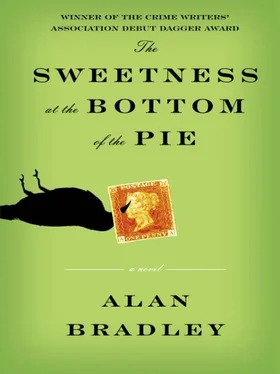Alan Bradley - The Sweetness at the Bottom of the Pie
Здесь есть возможность читать онлайн «Alan Bradley - The Sweetness at the Bottom of the Pie» весь текст электронной книги совершенно бесплатно (целиком полную версию без сокращений). В некоторых случаях можно слушать аудио, скачать через торрент в формате fb2 и присутствует краткое содержание. Жанр: Старинная литература, на английском языке. Описание произведения, (предисловие) а так же отзывы посетителей доступны на портале библиотеки ЛибКат.
- Название:The Sweetness at the Bottom of the Pie
- Автор:
- Жанр:
- Год:неизвестен
- ISBN:нет данных
- Рейтинг книги:3 / 5. Голосов: 1
-
Избранное:Добавить в избранное
- Отзывы:
-
Ваша оценка:
- 60
- 1
- 2
- 3
- 4
- 5
The Sweetness at the Bottom of the Pie: краткое содержание, описание и аннотация
Предлагаем к чтению аннотацию, описание, краткое содержание или предисловие (зависит от того, что написал сам автор книги «The Sweetness at the Bottom of the Pie»). Если вы не нашли необходимую информацию о книге — напишите в комментариях, мы постараемся отыскать её.
The Sweetness at the Bottom of the Pie — читать онлайн бесплатно полную книгу (весь текст) целиком
Ниже представлен текст книги, разбитый по страницам. Система сохранения места последней прочитанной страницы, позволяет с удобством читать онлайн бесплатно книгу «The Sweetness at the Bottom of the Pie», без необходимости каждый раз заново искать на чём Вы остановились. Поставьте закладку, и сможете в любой момент перейти на страницу, на которой закончили чтение.
Интервал:
Закладка:
"Four-and-twenty blackbirds, baked in a pie," I recited. "See?"
"You think?" Mary asked, her eyes like saucers.
"Bang on, Sherlock," I said. "This pie's filling was bird, and I think I can guess the species."
I held it out to her again. “What a pretty dish to set before the King,” I said, and this time she grinned at me.
I'd do the same with Inspector Hewitt, I thought, as I pocketed the thing. Yes! I'd solve this case and present it to him wrapped up in gaily colored ribbons.
"No need for you to come out here again," he'd said to me in the garden, that saucepot. What bloody cheek!
Well, I'd show him a trick or two!
Something told me that Norway was the key. Ned hadn't been in Norway, and besides, he had sworn he didn't leave the snipe on our doorstep and I believed him, so he was out of the question—at least for now.
The stranger had come from Norway, and I had heard that straight from the horse's mouth, so to speak! Ergo (that means “therefore”) the stranger could have brought the snipe with him.
In a pie.
Yes! That made sense! What better way to get a dead bird past an inquisitive H. M. Customs inspector?
Just one more step and we're home free: If the Inspector can't be asked how he knew about Norway, and nor can the stranger (obviously, since he is dead), who, then, does that leave?
And I suddenly saw it all, saw it spread out before me at my feet the way one must see from the top of a mountain. The way Harriet must have—
The way an eagle sees his prey.
I hugged myself with pleasure. If the stranger had come from Norway, dropped a dead bird on our doorstep before breakfast, and then appeared in Father's study after midnight, he must have been staying somewhere not far away. Somewhere within walking distance of Buckshaw. Some where such as right here in this very room at the Thirteen Drakes.
Now I knew it for certain: The corpse in the cucumbers was Mr. Sanders. There could be no doubt about it.
"Mary!"
It was Tully again, bellowing like a bull calf, and this time, it seemed, he was right outside the door.
"Coming, Dad!" she shouted, grabbing the wastebasket.
"Get out of here," she whispered. "Wait five minutes and then go down the back stairs—same way as we came up."
She was gone, and a moment later I heard her explaining to Tully in the hallway that she just wanted to give the wastebasket an extra clean-out, since someone left a mess in it.
"We wouldn't want somebody to die of germs they picked up at the Thirteen Drakes, would we, Dad?"
She was learning.
While I waited, I took a second look at the steamer trunk. I ran my fingers over the colored labels, trying to imagine where it had been in its travels, and what Mr. Sanders had been doing in each city: Paris, Rome, Stockholm, Amsterdam, Copenhagen, Stavanger. Paris was red, white, and blue, and so was Stavanger.
Was Stavanger in France? I wondered. It didn't sound French—unless, of course, it was pronounced “stah-vonj-yay” as in Laurence Olivier. I touched the label and it wrinkled beneath my finger, piled up like water ahead of the prow of a ship.
I repeated the test on the other stickers. Each one was pasted down tightly: as smooth as the label on a bottle of cyanide.
Back to Stavanger. It felt a little lumpier than the others, as if there were something underneath it.
The blood was humming in my veins like water in a millrace.
Again I pried the trunk open and took the safety razor from the drawer. As I extracted the blade, I thought how lucky it was that women—other than the occasional person like Miss Pickery at the library—don't need to shave. It was tough enough being a woman without having to lug all that tackle everywhere you went.
Holding the blade carefully between my thumb and forefinger (after the glassware incident I had been loudly lectured about sharp objects) I made a slit along the bottom of the label, taking great care to cut along the precise edge of a blue and red decorative line that ran nearly the full width of the paper.
As I lifted the incision slightly with the dull edge of the blade, something slid out and, with a whisper of paper, fell to the floor. It was a glassine envelope, similar to the ones I had noticed in Sergeant Graves's kit. Through its semi-transparency, I could see that there was something inside, something square and opaque. I opened the envelope and gave it a tap with my finger. Something fell out into the palm of my hand: two somethings, in fact.
Two postage stamps. Two bright orange postage stamps, each in its own tiny translucent jacket. Aside from their color, they were identical to the Penny Black that had been impaled upon the jack snipe's bill. Queen Victoria's face again. What a disappointment!
I didn't doubt that Father would have gone into positive raptures about the pristine perfection of the things, the enchantment of engraving, the pleasures of perforations, and the glories of glue, but to me they were no more than the sort of thing you'd slap on a letter to dreadful Aunt Felicity in Hampshire, thanking her for her thoughtful Christmas gift of a Neddy the Squirrel Annual.
Still, why bother putting them back? If Mr. Sanders and the body in our garden were, as I knew they were, one and the same, he was well past the need for postage stamps.
No, I thought, I'll keep the things. They might come in handy someday when I need to barter my way out of a scrape with Father, who is incapable of thinking stamps and discipline at the same time.
I shoved the envelope into my pocket, licked my forefinger, and moistened the inside edge of the slit in the label on the trunk. Then, with my thumb, I ironed it shut. No one, not even Inspector Fabian of the Yard, could ever guess it had been sliced open.
My time was up. I took one last look round the room, slipped out into the dim hallway and, as Mary had instructed me, moved carefully towards the back staircase.
"You're about as useless as tights on a bull, Mary! How the bloody hell can I stay on top of things when you're letting everything go to hell in a handbasket?"
Tully was coming up the back way; one more turning of the stairs and we'd be face-to-face!
I flew on tiptoe in the other direction, through the twisting, turning labyrinth of corridors: up two steps here, down three there. A moment later, panting, I found myself at the top of the L-shaped staircase that led down to the front entrance. As far as I could see, there was no one below.
I tiptoed down, one slow step at a time.
A long hallway, hung profusely with dark, water-stained sporting prints, served as a lobby, in which centuries of sacrificed kippers had left the smell of their smoky souls clinging to the wallpaper. Only the patch of sunshine visible through the open front door relieved the gloom.
To my left was a small desk with a telephone, a telephone directory, a small glass vase of red and mauve pansies, and a ledger. The register!
Obviously, the Thirteen Drakes was not a busy beehive: Its open pages bore the names of travelers who had signed in for the past week and more. I didn't even have to touch the thing.
There it was:

2nd June 10:25 A.M. F.X. Sanders London
NO OTHER GUESTS HAD REGISTERED the day before, and none since.
But London? Inspector Hewitt had said that the dead man had come from Norway and I knew that, like King George, Inspector Hewitt was not a frivolous man.
Well, he hadn't said exactly that: He'd said that the deceased had recently come from Norway, which was a horse of an entirely different hue.
Before I could think this through, there was a banging from above. It was Tully again; the ubiquitous Tully. I could tell by his tone that Mary was still getting the worst of it.
Читать дальшеИнтервал:
Закладка:
Похожие книги на «The Sweetness at the Bottom of the Pie»
Представляем Вашему вниманию похожие книги на «The Sweetness at the Bottom of the Pie» списком для выбора. Мы отобрали схожую по названию и смыслу литературу в надежде предоставить читателям больше вариантов отыскать новые, интересные, ещё непрочитанные произведения.
Обсуждение, отзывы о книге «The Sweetness at the Bottom of the Pie» и просто собственные мнения читателей. Оставьте ваши комментарии, напишите, что Вы думаете о произведении, его смысле или главных героях. Укажите что конкретно понравилось, а что нет, и почему Вы так считаете.












